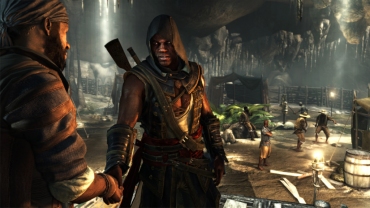So what happened to the Jackdaw’s first mate – the brooding ex-slave Adewale – when he left the ship for a life among the Assassins? Well, that’s something that Freedom Cry, the recently released DLC expansion for Assassin’s Creed 4: Black Flag, sheds a little light on.
Set some fifteen years after the conclusion of the story presented in the main title, Freedom Cry takes us to an all-new location: Port-au-Prince, in the West Indies. It is in this French town that Adewale encounters a resistance movement of slaves fighting for their freedom, and helps them undertake steps towards achieving this lofty goal.
The setting is great, and very different from that of Black Flag. However, it is also much smaller in size, and the joy of exploration that Black Flag presented the player with is all but absent from Freedom Cry. This forces the player to concentrate on the three odd hours of main story line, with maybe another two hours thrown in for side quests. It’s short, but it is also quite rewarding. The player will constantly be presented with opportunities to free slaves. As the number of freed slaves increases, the player will be granted new equipment and bonuses. However, the overall impact of freeing slaves on the title is less than it could have been – in the end, it becomes a moral choice for the player whether they want to do it or not.
These opportunities arise all over Port-au-Prince, ranging from helping runaways to escape through to crashing auctions and even liberating entire plantations. Some of the story missions are locked until the player has freed a certain number of slaves or completed certain side missions, which is good and well, but once again reinforces the idea that there isn’t much freedom in a game with the word in its title.
Freedom Cry features a story that is arguably much stronger (and more important) than the sometimes lacklustre tale told by Black Flag. It’s not much of a trade-off for the freedom that gets taken away from the player, but the plot is intriguing, and Adewale makes for a very different type of character to play. Where Edward Kenway was about finesse in combat, Adewale is about brute force. He is armed with a massive machete, as well as a blunderbuss – a slow firing old-world version of a shotgun that can take down multiple targets at a time.
Freedom Cry adds another enjoyable look at the Caribbean, and brings up some rather important plot devices… but ultimately, it feels like Black Flag Lite. The joy of ship battles is certainly lessened, although these are often more challenging in Freedom Cry, and the vast exploration opportunities of the former are sadly lacking here.
Still, Adewale’s tale is tightly constructed and beautifully told, even if the main villain is a little flat, and the player will be able to find numerous challenges in their approach to freeing slaves and bolstering the numbers of the rebellious Maroons. On top of that, Port-au-Prince is a lively, vibrant setting to explore, and the action is brutal and heavy handed. Adewale feels more like an assassin than Kenway ever did, despite his less-finessed combat, and the overall plot simply feels like a better story than that of Black Flag – even if it is a much shorter experience. But you cannot get away from the fact that the player simply doesn’t have enough freedom here, which does shackle Freedom Cry’s experience a little.
Verdict:
Though short and less free than Black Flag, Freedom Cry tells a better story and is well worth the effort.
Developer: Ubisoft
Publisher: Ubisoft
Distributer: Online
Platforms:
PC, XBox 360, XBox One, PS3, PS4

